

E-Books → Small Business Human Resources Secrets
Published by: voska89 on 29-07-2021, 15:32 |  0
0

Small Business Human Resources Secrets: The Right Way to Hire, Cultivate and Terminate Employees, All While Improving Your Marketing by Naked Book Publishing
English | October 22, 2018 | ISBN: 0986088889 | 110 pages | EPUB | 0.65 Mb
Three of the hardest obstacles facing you as an entrepreneur are marketing what you do, selling what you do to new and existing clients and then training, motivating and retaining the best employees who will help your business thrive. In Small Business Human Resource Secrets, business coaches Sharyn and Hank Yuloff share ways that you can make that happen faster and easier. Known as "Americas #1 Coaching Team for Small Businesses" the Yuloffs have added this resource into their continuously growing library of business books for the small business entrepreneur. In this book, you will learn ways to make your Human Resources efforts more effective for your overall business because you will begin to approach it from a marketing point of view.
E-Books → The Logical Structure of Human Behavior
Published by: voska89 on 28-07-2021, 19:01 |  0
0
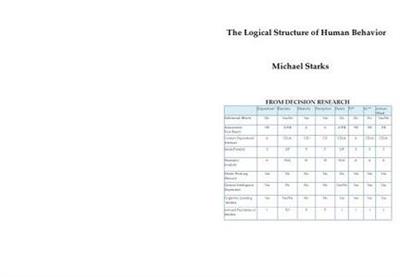
The Logical Structure of Human Behavior By Michael Starks
2019 | 120 Pages | ISBN: 1798232944 | PDF | 2 MB
"He who understands baboon would do more towards metaphysics than Locke" Charles Darwin 1838 Notebook MThis book is about human behavior (as are all books by anyone about anything), and so about the limitations of having a recent monkey ancestry (8 million years or much less depending on viewpoint) and manifest words and deeds within the framework of our innate psychology as presented in the table of intentionality. As famous evolutionist Richard Leakey says, it is critical to keep in mind not that we evolved from apes, but that in every important way, we are apes. If everyone was given a real understanding of this (i.e., of human ecology and psychology to actually give them some control over themselves), maybe civilization would have a chance. As things are however the leaders of society have no more grasp of things than their constituents and so collapse into anarchy and dictatorship is inevitable. In order to provide an overview of the logical structure of higher order human behavior, that is of the descriptive psychology of higher order thought (mind, language, rationality, personality, intentionality), or following Wittgenstein, of language games, I give a critical survey of some of the major findings of Ludwig Wittgenstein and John Searle, taking as my starting point Wittgenstein's fundamental discovery -that all truly 'philosophical' (i.e., higher order psychological) problems are the same-confusions about how to use language in a particular context, and so all solutions are the same-looking at how language can be used in the context at issue so that its truth conditions (Conditions of Satisfaction or COS) are clear. The basic problem is that one can say anything, but one cannot mean (state clear COS for) any arbitrary utterance and meaning is only possible in a very specific context. I give an analysis from the recent modern perspective of the two systems of thought, employing a new table of intentionality and new dual systems nomenclature.It is critical to understand why we behave as we do and so I try to describe (not explain as Wittgenstein insisted) behavior. I start with a brief review of the logical structure of rationality, which provides some heuristics for the description of language (mind, rationality, personality) and gives some suggestions as to how this relates to the evolution of social behavior. This centers around the two writers I have found the most important in this regard, Ludwig Wittgenstein and John Searle, whose ideas I combine and extend within the dual system (two systems of thought) framework that has proven so useful in recent understanding of behavior and in thinking and reasoning research. As I note, there is in my view essentially complete overlap between philosophy, in the strict sense of the enduring questions that concern the academic discipline, and the descriptive psychology of higher order thought (behavior). Once one has grasped Wittgenstein's insight that there is only the issue of how the language game is to be played, one determines the Conditions of Satisfaction (what makes a statement true or satisfied etc.) and that is the end of the discussion. Since philosophical problems are the result of our innate psychology, or as Wittgenstein put it, due to the lack of perspicuity of language, they run throughout human discourse and behavior, so there is endless need for philosophical analysis, not only in the 'human sciences' of philosophy, sociology, anthropology, political science, psychology, history, literature, religion, etc., but in the 'hard sciences' of physics, mathematics, and biology. It is universal to mix the language game questions with the real scientific ones as to what the empirical facts are. Scientism is ever present, and the master has laid it before us long ago, i.e., Wittgenstein (hereafter W) beginning with the Blue and Brown Books in the early 1930's."Philosophers constantly see the method of science before their eyes and are irresistibly tempted to ask and answer questions in the way science does. This tendency is the real source of metaphysics and leads the philosopher into complete darkness." (BBB p18)Nevertheless, a real understanding of Wittgenstein's work, and hence of how our psychology functions, is only beginning to spread in the second decade of the 21st century, due especially to P.M.S. Hacker (hereafter H) and Daniele Moyal-Sharrock (hereafter DMS), but also to many others, some of the more prominent of whom I mention in the articles. Horwich gives the most beautiful summary that I have ever seen of where an understanding of Wittgenstein leaves us."There must be no attempt to explain our linguistic/conceptual activity (PI 126) as in Frege's reduction of arithmetic to logic; no attempt to give it epistemological foundations (PI 124) as in meaning based accounts of a priori knowledge; no attempt to characterize idealized forms of it (PI 130) as in sense logics; no attempt to reform it (PI 124, 132) as in Mackie's error theory or Dummett's intuitionism; no attempt to streamline it (PI 133) as in Quine's account of existence; no attempt to make it more consistent (PI 132) as in Tarski's response to the liar paradoxes; and no attempt to make it more complete (PI 133) as in the settling of questions of personal identity for bizarre hypothetical 'teleportation' scenarios."Although there are countless books and articles on Wittgenstein, in my view only a few very recent ones (DMS, H, Coliva etc.) come close to a full appreciation of him, none make a serious attempt to relate his work to one of the other modern geniuses of behavior John Searle (hereafter S) and nobody has applied the powerful two systems of thought framework to philosophical issues from the viewpoint of evolutionary psychology. I attempt to do this here. I provide a critical survey of some of the major findings of Wittgenstein and Searle on the logical structure of intentionality (mind, language, behavior), taking as my starting point Wittgenstein's fundamental discovery -that all truly 'philosophical' problems are the same-confusions about how to use language in a particular context, and so all solutions are the same-looking at how language can be used in the context at issue so that its truth conditions (Conditions of Satisfaction or COS) are clear. The basic problem is that one can say anything but one cannot mean (state clear COS for) any arbitrary utterance and meaning is only possible in a very specific context. I analyze various writings by and about them from the perspective of the two systems of thought, employing a new table of intentionality and new dual systems nomenclature.When I read 'On Certainty' a few years ago I characterized it in a review as the Foundation Stone of Philosophy and Psychology and the most basic document for understanding behavior, and about the same time DMS was writing articles noting that it had solved the millennia old epistemological problem of how we can know anything for certain. I realized that W was the first one to grasp what is now characterized as the two systems or dual systems of thought, and I generated a dual systems (S1 and S2) terminology which I found to be very powerful in describing behavior. I took the small table that John Searle (hereafter S) had been using, expanded it greatly, and found later that it integrated perfectly with the framework being used by various current workers in thinking and reasoning research. Since they were published individually, I have tried to make the book reviews and articles stand by themselves, insofar as possible, and this accounts for the repetition of various sections, notably the table and its explanation. I start with a short article that presents the table of intentionality and briefly describes its terminology and background. Next, is by far the longest article, which attempts a survey of the work of W and S as it relates to the table and so to an understanding or description (not explanation as W insisted) of behavior.It is my contention that the table of intentionality (rationality, mind, thought, language, personality etc.) that features prominently here describes more or less accurately, or at least serves as an heuristic for, how we think and behave, and so it encompasses not merely philosophy and psychology, but everything else (history, literature, mathematics, politics etc.). Note especially that intentionality and rationality as I (along with Searle, Wittgenstein and others) view it, includes both conscious deliberative System 2 and unconscious automated System 1 actions or reflexes. The astute may wonder why we cannot see System 1 at work, but it is clearly counterproductive for an animal to be thinking about or second guessing every action, and in any case, there is no time for the slow, massively integrated System 2 to be involved in the constant stream of split second 'decisions' we must make. As W noted, our 'thoughts' (T1 or the 'thoughts' of System 1) must lead directly to actions. The key to everything about us is biology, and it is obliviousness to it that leads millions of smart educated people like Obama, Chomsky, Clinton and the Pope to espouse suicidal utopian ideals that inexorably lead straight to Hell on Earth. As W noted, it is what is always before our eyes that is the hardest to see. We live in the world of conscious deliberative linguistic System 2, but it is unconscious, automatic reflexive System 1 that rules. This is the source of the universal blindness described by Searle as The Phenomenological Illusion (TPI), Pinker as The Blank Slate and Tooby and Cosmides as The Standard Social Science Model. As I note, The Phenomenological Illusion (oblivion to our automated System 1) is universal and extends not merely throughout philosophy but throughout life. I am sure that Chomsky, Obama, Zuckerberg and the Pope would be incredulous if told that they suffer from the same problem as Hegel, Husserl and Heidegger, (or that that they differ only in degree from drug and sex addicts in being motivated by stimulation of their frontal cortices by the delivery of dopamine (and over 100 other chemicals) via the ventral tegmentum and the nucleus accumbens), but it's clearly true. While the phenomenologists only wasted a lot of people's time, they are wasting the earth and their descendant's futures.The modern 'digital delusions', confuse the language games of System 2 with the automatisms of System 1, and so cannot distinguish biological machines (i.e., people) from other kinds of machines (i.e., computers). The 'reductionist' claim is that one can 'explain' behavior at a 'lower' level, but what actually happens is that one does not explain human behavior but a 'stand in' for it. Hence the title of Searle's classic review of Dennett's book ("Consciousness Explained")- "Consciousness Explained Away". In most contexts 'reduction' of higher level emergent behavior to brain functions, biochemistry, or physics is incoherent. Also, for 'reduction' of chemistry or physics, the path is blocked by chaos and uncertainty (and chaos theory has been shown to be both incomplete in Godel's sense and undecidable). Anything can be 'represented' by equations, but when they 'represent' higher order behavior, it is not clear (and cannot be made clear) what the 'results' mean. Reductionist metaphysics is a joke, but most scientists and philosophers lack the appropriate sense of humor. I had hoped to weld my comments into a unified whole, but I came to realize, as Wittgenstein and AI researchers did, that the mind (roughly the same as language as Wittgenstein showed us) is a motley of disparate pieces evolved for many contexts, and there is no such whole or theory except inclusive fitness, i.e., evolution by natural selection.Finally, as with my 90 some articles and 9 other books, and in all my letters and email and conversations for over 50 years, I have always used 'they' or 'them' instead of 'his/her', 'she/he', or the idiotic reverse sexism of 'she' or 'her', being perhaps the only one in this part of the galaxy to do so. The slavish use of these universally applied egregious vocables is of course intimately connected with the defects in our psychology which generate academic philosophy, democracy and the collapse of industrial civilization, and I leave the further description of these connections as an exercise for the reader.Those interested in my other writings may see Talking Monkeys 2nd ed (2019), The Logical Structure of Philosophy, Psychology, Mind and Language in Ludwig Wittgenstein and John Searle 3rd ed. (2019), Suicide by Democracy 2nd ed (2019) and Suicidal Utopian Delusions in the 21st Century 4th ed (2019).
E-Books → The Future of Post-Human Formal Science - A Preface to a New Theory of Abstraction...
Published by: ad-team on 28-07-2021, 10:12 |  0
0

The Future of Post-Human Formal Science - A Preface to a New Theory of Abstraction and Application
pdf | 3.32 MB | English | Isbn: 978-1443819466 | Author: Baofu, Peter. | Year: 2010
E-Books → The Future of Post-human Sexuality - A Preface to a New Theory of the Body and Spi...
Published by: ad-team on 28-07-2021, 10:09 |  0
0
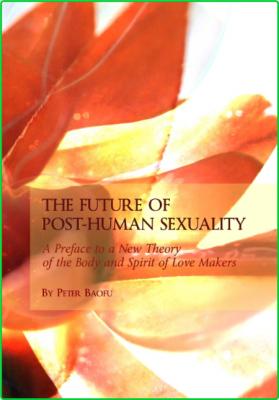
The Future of Post-human Sexuality - A Preface to a New Theory of the Body and Spirit of Love Makers
pdf | 3.27 MB | English | Isbn: 978-1443817196 | Author: Baofu, Peter. | Year: 2010
E-Books → The Future of Post-Human Performing Arts - A Preface to a New Theory of the Body a...
Published by: ad-team on 28-07-2021, 10:03 |  0
0
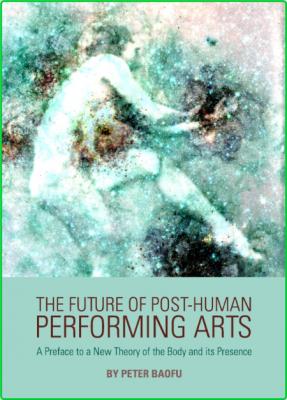
The Future of Post-Human Performing Arts - A Preface to a New Theory of the Body and its Presence
pdf | 4.19 MB | English | Isbn: 978-1443835206 | Author: Peter Baofu | Year: 2012
E-Books → The Torture Doctors Human Rights Crimes and the Road to Justice
Published by: voska89 on 28-07-2021, 01:08 |  0
0

The Torture Doctors : Human Rights Crimes and the Road to Justice
by Steven H. Miles
English | 2020 | ISBN: 1626167524 | 222 Pages | PDF | 1.28 MB
E-Books → Himalaya A Human History [Audiobook]
Published by: voska89 on 28-07-2021, 01:03 |  0
0
![Himalaya A Human History [Audiobook] Himalaya A Human History [Audiobook]](https://i115.fastpic.org/big/2021/0728/ec/bf86d3abb666f12dccace8a1ab9c68ec.jpeg)
English | ASIN: B08WHYKP1F | 2021 | 26 hours and 41 minutes |MP3|M4B | 734 MB
For centuries, the unique and astonishing geography of the Himalaya has attracted those in search of spiritual and literal elevation: pilgrims, adventurers, and mountaineers seeking to test themselves among the world's most challenging peaks. But far from being wild and barren, the Himalaya has been home to a diversity of indigenous and local cultures, a crucible of world religions, a crossroads for trade, and a meeting point and conflict zone for empires past and present. In this landmark work, Ed Douglas makes a thrilling case for the Himalaya's importance in global history and offers a soaring account of life at the "roof of the world".
Spanning millennia, from the earliest inhabitants to the present conflicts over Tibet and Everest, Himalaya explores history, culture, climate, geography, and politics. Douglas profiles the great kings of Kathmandu and Nepal; he describes the architects who built the towering white Stupas that distinguish Himalayan architecture; and he traces the flourishing evolution of Hinduism, Islam, and Buddhism that brought Himalayan spirituality to the world. He also depicts the story of how the East India Company grappled for dominance with China's emperors, how India fought Mao's Communists, and how mass tourism and ecological transformation are obscuring the bloody legacy of the Cold War.
E-Books → The Future of Post-Human Law - A Preface to a New Theory of Necessity, Contingency...
Published by: ad-team on 27-07-2021, 14:46 |  0
0
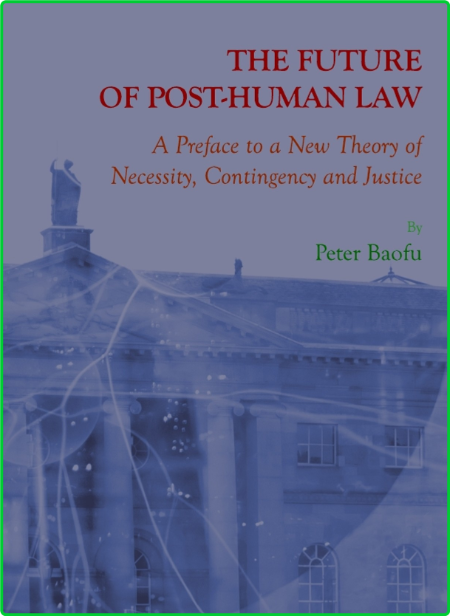
The Future of Post-Human Law - A Preface to a New Theory of Necessity, Contingency and Justice
pdf | 3.3 MB | English | Isbn: 978-1443819497 | Author: Baofu, Peter. | Year: 2010
E-Books → The Concise Human Body Book - An Illustrated Guide to its Structure, Function and ...
Published by: ad-team on 27-07-2021, 14:45 |  0
0

The Concise Human Body Book - An Illustrated Guide to its Structure, Function and Disorders ( - AZW3)
epub, azw3 | 78.9 MB | English | Isbn: B07Z1BJK6V | Author: Unknown | Year: 2019
E-Books → Research agenda. The human factor in cybercrime and cybersecurity
Published by: voska89 on 27-07-2021, 14:27 |  0
0
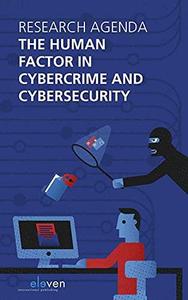
Research agenda. The human factor in cybercrime and cybersecurity. By Eric Rutger Leukfeldt
2017 | 99 Pages | ISBN: 9462367531 | PDF | 8 MB
This research agenda is the outcome of the national cybercrime initiative('NASA Cybercrime') coordinated by the Netherlands Institute forthe Study of Crime and Law Enforcement (NSCR) and funded by theNetherlands Organization for Scientifc Research (NWO).



